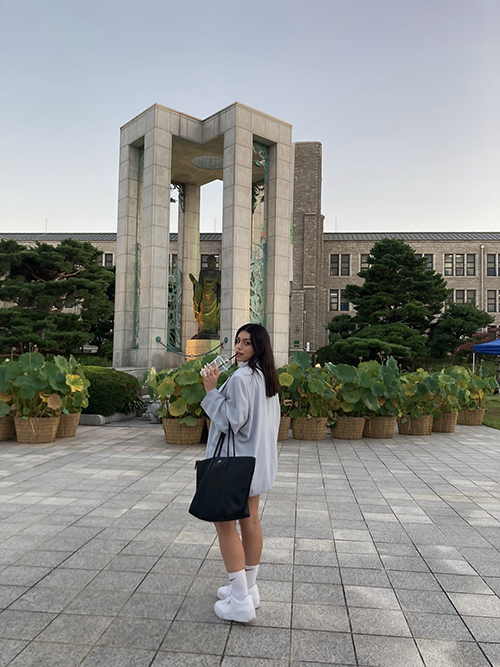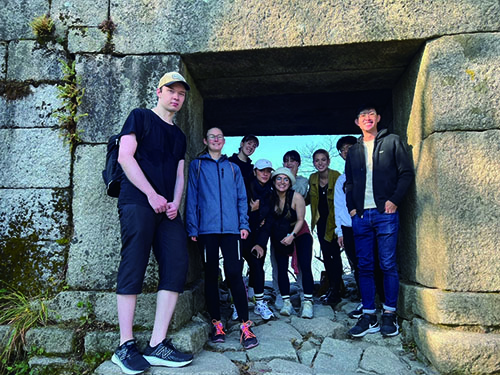 (From the top ; Manuela Ávila Lea Bahr )Exchange students are enjoying happy life in Korea. /Photography from Lea Bahr and Manuela Ávila |
 (From the top ; Manuela Ávila Lea Bahr )Exchange students are enjoying happy life in Korea. /Photography from Lea Bahr and Manuela Ávila |
In issue No.453, the Dongguk Post looked at various international exchange programs. In No.454, the Dongguk Post will take a closer look at a system in which foreign universities with student exchange agreements are dispatched for one or two semesters to continue their studies, and learn the language and culture of the other country. Through the exchange student system, students can also receive credits at their school, allowing them to enjoy life in other countries. While they are dispatched as exchange students, students pay tuition to their school, and listen to classes at the other school where they are sent and live in the same status as students at the other school. Before entering the college, everyone might have dreamed of becoming an exchange student at least once. Since face-to-face classes have resumed, students were able to see many foreigners at school. Therefore, the Dongguk Post interviewed foreigners living in Korea who have traveled many places from distant countries.
Q. Are there many people who come to Korea as exchange students from your own countries? Then, why did you choose Dongguk University among Korean schools that you could go to as an exchange student?
Lea Bahr: There are three Germans from my university and about 15 Germans in total in the fall semester 2022 at Dongguk University. There were three Universities in Korea to choose from and I chose here. I chose Korea because it is far away from Germany, it is kind of “exotic” and different from our culture, which is attractive. Furthermore, the date and duration of Dongguk fitted well with my university schedule at home. In addition, it is centrally located in Seoul.
Gisela Ramon: Yes, there are a total of nine or ten Spanish students from all around Spain, so it is nice to have people from my own country in Korea. I chose Korea for my exchange trip because my major is related to Asia and I wanted to come to an Asian country. I have been studying Korean since I was 16 years old, so that was another reason I wanted to come, to practice the language! I chose Dongguk because it is a really good university, it is located in the center of Seoul, and there are many good subject options in English!
Q. Do you think your Korean has improved a lot since you came here?
Lea Bahr: I did not know any Korean and I did not have time to learn it. So I could only say words like “Hello” and “Thank you.”
Gisela Ramon: I started learning Korean in Spain when I was 16 years old but I was self-taught, so I could not practice with anyone. However, since I came here, I think my Korean has improved a lot. It is because, I have to speak Korean every day and when a stranger talks to me in English I try to respond in Korean to practice.
Q. Are you satisfied with your life in Korea and Dongguk University as an exchange student? What is more satisfactory compared to your country or your school? If you are sad, what are you sad about?
Lea Bahr: Yes I like it. The country is very safe. The weather has been very good till now. Going out into restaurants is very cheap. I like experiencing the different way of teaching and studying in Korea compared to Europe. I am only sad not being able to see my family for so long.
Q. Is there anything you expected or imagined before coming here as an exchange student? If it is so, is there a difference or are you enjoying it with satisfaction?
Lea Bahr: I expected it to be more like other Asian countries I visited, such as Thailand. However, the values and lifestyle are more Western-oriented than traditional Asian countries.
Q. What is the difficulty level of assignments, classes, and exams ? Also, have you ever felt a big difference in class and examination or assignment compared to your country?
Lea Bahr: The teaching style is very different but the difficulty level is about the same. In Germany we have one big exam at the end of the semester. In Korea there are lots of homeworks, quizzes, assignments and so on. In Germany we have to use our knowledge practically whereas in Korea we only have to memorize power point presentation slides.
Gisela Ramon: About my classes, all of them are in English, because I did not think my Korean level was good enough to take a full class in Korean. So, for the language I think it is okay. In Spain, I also have to take English classes, so it is not a big deal. About finding a big difference, yes, Dongguk classes are really different compared to my home university! Here attendance is mandatory, and classes end when the professor finishes with their lesson, so every class has a different ending time. In Spain, attendance is not mandatory and classes always last the same amount of time. It was two hours in my case. However, for assignments and exams, I think they are pretty similar.
Q. Please tell us the most impressive memory of living in Korea as an exchange student.
Lea Bahr: The thing I will always remember was climbing Mountain Halla on Jeju Island, the highest mountain in South Korea. It felt like being on top of the world.
Q. What was the most difficult thing while preparing to be an exchange student? Or what was the greatest difficulty in adapting to Korea? Did you have any difficulties in living in Korea except for verbal communication?
Lea Bahr: It was hard to get an appointment with the embassy to get the VISA, and there was a bit of time pressure. In Korea, it is hard to meet local Koreans because they are often shy or do not want to speak English.
Gisela Ramon: I think the hardest part was getting all the paperwork done including VISA, Foreign Registration Card, and COVID-19 test. You have to bring a lot of papers and go to different places to get all the documents done. Without these things, I do not think it has been a rough time adapting here. Everyone is willing to help, so that is a relief when you do not know what to do!
Q. Do you think the experience of an exchange student was of great help to your studies or life?
Lea Bahr: Yes! Learning about cultures and developing myself by becoming more independent and confident.
Q. Is there anything you want to say to your overseas friends who want to come to Dongguk University as an exchange student or those who have a difficulty adjusting? Or do you have your own tips for enjoying your school life?
Lea Bahr: Take the opportunity, and you will not regret it! It might be hard sometimes however, it is worth the effort. You will make experiences that you will never forget and you learn for your life.
Q. Do you think Dongguk University has good welfare or programs for exchange students? If so, was there anything that disappointed you?
Lea Bahr: Dongguk International Student Support Association (DISSA) is organizing a few nice things but there could be more exchange with the buddies and local Koreans in general.
Gisela Ramon: Yes, I think Dongguk has a really nice program for exchange students! They have DISSA, which is a really helpful team, and they try to make us exchange students feel at home. They gave us welcoming kits, Dongguk Buddies, and International Week. They include exchange students to every activity they make so we get to live in a way Korean university students live. In conclusion, I am really happy to have chosen this university for my exchange student experience. I would love to come back one day, and when I go back to Barcelona, I will definitely tell my friends to come here if they want to study in Korea!
International students can have a meaningful school life through exchange student systems such as DISSA at our school. In addition, exchange students can experience a wider world while studying at schools in other countries, taking classes in different ways and experiencing culture.
The exchange student program, where you can learn other languages and not only meet friends but also study your major in depth, will surely be a good memory.

